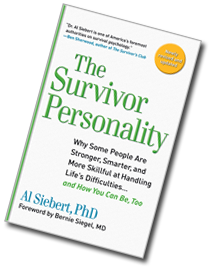How To Be A Survivor
The Gayle King Show* about "Women Survivors"
by Al Siebert, Ph.D.
When I was on Gayle King's TV program about "Women Survivors" in 1997, Gayle asked me if someone can have a survivor personality without knowing it. I said "Yes! You do!"
She was surprised and the audience burst out laughing. Unfortunately, we took a break at that moment and didn't come back to it when we started taping again.
In the next segment Gayle asked "How can someone learn to be a survivor?" I didn't have time to explain on air, but can do that here. First, however, this is why I said to Gayle that she has many survivor qualities, but doesn't know it:
During the show Gayle asked me about why some people are survivors. I explained that in an emergency many people get panicky, but survivors calm themselves, orient quickly to what is happening, and search for coping strategies. Jackie Pflug, for example, when she found herself still alive and conscious on the runway after she was shot in the back of the head and pushed down the stairs by the hijacker, told herself to remain calm and made herself lay without moving for five hours. Gayle said she isn't like that, she gets panicky.
I was surprised to hear her say that about herself. Before the show I read articles about Gayle and learned that she is a very resilient person who keeps getting better and better. After college she started working as an assistant television producer. Now she is an award winning television news anchor.
Gayle take risks, learns lessons, and tries again. Several years ago she tried to launch her own national television show. It didn't do very well and was cancelled. She learned good lessons and now has a much better national show. A divorce and her new role as a single mother with two sons has led her to find new strengths.
Gayle has a strong desire to make a useful contribution to people's lives. Her show increases understanding, opens viewers minds to new possibilities, and empowers them. During the show I watched her handle many interruptions during taping process in a patient, stable, self-confident way. She talked with the audience during pauses and held the group energy together with humor and personal comments. In her interviews she let her curiosity carry her away from the producer's instructions about what she was supposed to be asking. She listens to people with empathy, comprehends quickly, and trust her instincts.
These are qualities I find again and again in people who cope well with extreme difficulties and are made better by rough experiences. When Gayle told me she doesn't react like survivors, I saw that her conscious belief about herself is inconsistent with how she actually conducts herself! She has many survivor personality qualities without knowing it.
Can someone learn to be a survivor? Yes. Almost everyone has what it takes if they allow themselves to develop the qualities.
If you are like Gayle, and have a self-belief that does not accurately reflect your true coping skills, my suggestion is to add the word "sometimes" to your statement about how you react to danger or an emergency. Say "Sometimes I get flustered," or "Sometimes I feel panicky."
This qualifying word will lead you to appreciate that many times you do cope well. It will weaken your erroneous belief that you don't. It will make you more conscious of having a choice about how you react. In an emergency, when adrenaline surges through your body, you can instruct yourself to stay calm and to cope.
Most importantly, however, you learn to be a survivor by learning good lessons from bad experiences:
- Pick one incident from your past where you felt overwhelmed or didn't cope well.
- Go back and imagine yourself handling it well. What do you wish you would have said or done differently?
- Use the experience as a valuable training session in the school of life. Ask yourself "what is the lesson I need to learn from that experience?"
- Replay in your mind handling the incident well. Mentally rehearse what you will do the next time in a similar situation.
- Then pick another memory and go through the same process.
Try these suggestions and notice what happens. Most people find that by reworking their memories of their past experiences they increase their self-confidence. At the very least, it changes how you talk about your past. It lets you get out of the victim/blaming habit and makes you a more interesting person to talk with.
* Note: Since being on Gayle King's TV Show in 1997, Dr. Siebert has had no contact with her and does not know how to reach her. Gayle is a good friend of Oprah Winfrey's and Oprah's staff may know how to contact her.
